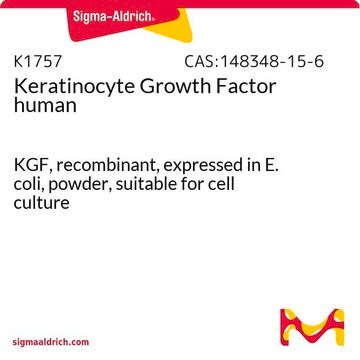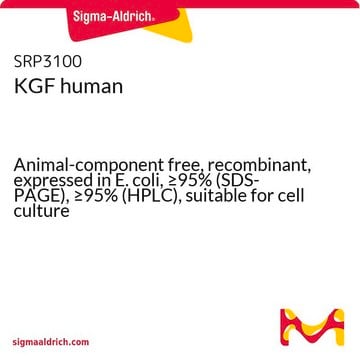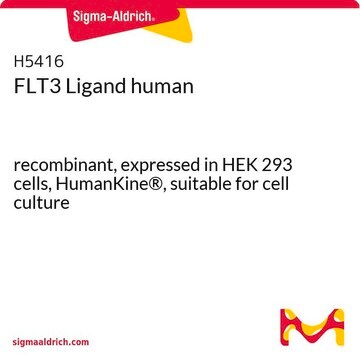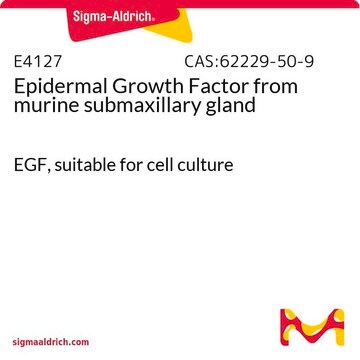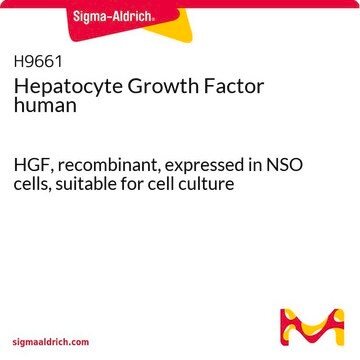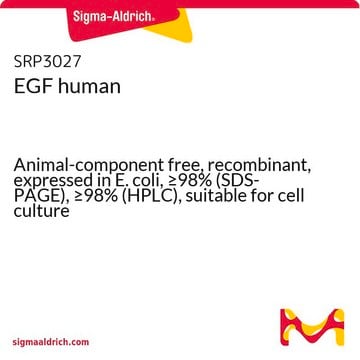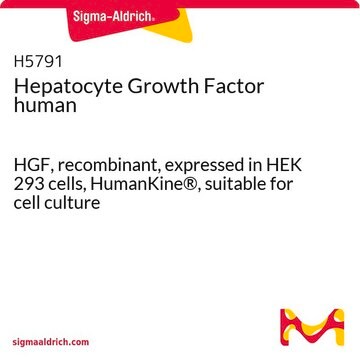H6666
Keratinocyte Growth Factor human
HumanKine®, >95% (SDS-PAGE), recombinant, expressed in HEK 293 cells, lyophilized powder, suitable for cell culture
Synonym(s):
FGF-7, KGF
Sign Into View Organizational & Contract Pricing
Select a Size
All Photos(1)
Select a Size
Change View
About This Item
Recommended Products
Product Name
Keratinocyte Growth Factor human, KGF, recombinant, expressed in HEK 293 cells, HumanKine®, suitable for cell culture
biological source
human
Quality Level
recombinant
expressed in HEK 293 cells
Assay
>95% (SDS-PAGE)
form
lyophilized powder
potency
4-20 ng/mL EC50
quality
endotoxin tested
mol wt
dimer 17-30 kDa (glycosylated)
packaging
pkg of 10 μg
Looking for similar products? Visit Product Comparison Guide
General description
Keratinocyte Growth Factor (KGF) belongs to the fibroblast growth factor 7 (FGF-7) family. It is produced by the mesenchymal cells, γδ T cells, and fibroblasts in several organs. The KGF gene is located on the human chromosome at 15q21.2.
Application
Keratinocyte Growth Factor (KGF) human has been used as a component of the keratinocyte differentiation medium.
Biochem/physiol Actions
Keratinocyte Growth Factor (KGF) exerts paracrine effects on mesenchymal cells. It exhibits cryoprotective effects on epithelial cells of the lungs, gastrointestinal tract, and the lungs. KGF participates in the activation of IIIb isoform of the fibroblast growth factor (FGF)-receptor 2 (FGFR2-IIIb) present on keratinocytes. This activation further favors proliferation, migration, and survival of keratinocytes.
Physical form
Lyophilized from a 0.2 μm filtered solution of 1x PBS.
Preparation Note
HumanKine Keratinocyte Growth Factor (KGF) is expressed as glycosylated 17 and 30 kDa monomers in human HEK 293 cells. Production in human HEK 293 cells offers authentic glycosylation. Glycosylation contributes to stability in cell growth media and other applications.
Analysis Note
The activity was determined by the dose-dependent stimulation of the proliferation of 4MBr-5 cells (monkey epithelial cell line).
Legal Information
HumanKine is a registered trademark of Proteintech Group, Inc. and Humanzyme, Inc
comparable product
Product No.
Description
Pricing
Storage Class Code
11 - Combustible Solids
WGK
WGK 3
Flash Point(F)
Not applicable
Flash Point(C)
Not applicable
Choose from one of the most recent versions:
Already Own This Product?
Find documentation for the products that you have recently purchased in the Document Library.
Michael J LaFemina et al.
American journal of physiology. Lung cellular and molecular physiology, 299(6), L724-L734 (2010-09-14)
Keratinocyte growth factor (KGF) has efficacy in several experimental models of lung injury; however, the mechanisms underlying KGF's protective effect remain incompletely understood. This study was undertaken to determine whether KGF augments barrier function in primary rat alveolar epithelial cells
Qandeel Fatima et al.
Open life sciences, 13, 544-552 (2018-12-31)
Autologous skin grafts are used to treat severe burn wounds, however, the availability of adequate donor sites makes this option less practical. Recently, stem cells have been used successfully in tissue engineering and in regenerative medicine. The current study aims
Susanne Braun et al.
Journal of cell science, 119(Pt 23), 4841-4849 (2006-11-09)
Owing to its potent cytoprotective properties for epithelial cells, keratinocyte growth factor (KGF) is successfully used for the treatment of chemotherapy- and radiotherapy-induced oral mucositis in cancer patients. It is therefore of major interest to determine possible clinical applications of
Umbilical cord tissue derived mesenchymal stem cells can differentiate into skin cells
Fatima Q, et al.
The Open Immunology Journal, 13(1), 544-552 (2018)
Verônica Chomiski et al.
Acta cirurgica brasileira, 31(8), 505-512 (2016-09-01)
To evaluate the effect of keratinocyte growth factor (KGF) treatment on the expression of wound-healing-related genes in cultured keratinocytes from burn patients. Keratinocytes were cultured and divided into 4 groups (n=4 in each group): TKB (KGF-treated keratinocytes from burn patients)
Our team of scientists has experience in all areas of research including Life Science, Material Science, Chemical Synthesis, Chromatography, Analytical and many others.
Contact Technical Service